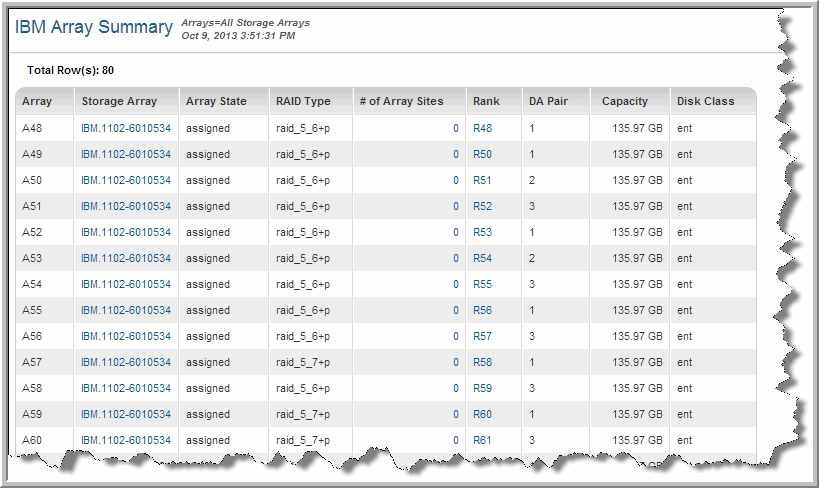IBM Array Summary
Use Quick Search to find a template, report or dashboard by name. Search is case insensitive, supports partial entries, and will display a list of potential matches.
As you enter the name in the Search field, up to 10 potential matches are displayed. If the template, report or dashboard is shown, you can select and run it directly from the match list. You can also click All Items in the match list to go directly to the Search Results.
Use the Explorer to browse through the StorageConsole templates, dashboards and reports. The navigation pane displays templates organized by products along with user-created, and system folders. This report is located here:
Capacity Manager > Array Capacity & Utilization > IBM Array Summary
Understanding IBM Enterprise Storage Capacity Calculations
• Capacity values for IBM arrays may appear different from what is reported by the IBM CLI or IBM Tools, as IBM uses a decimal gigabyte—10^9 bytes, while StorageConsole uses 1024 for a KB when converting to GB.
• For FB open systems hosts, an extent is 1 GB. For CKD IBM zSeries or S/390 systems, an extent is 1 cylinder (.92 GB).
In the Scope Selector, you can narrow the report output by selecting values for the following criteria:
• State: Assigned, Unassigned, Unavailable
• RAID Types: 5, 6, 10
• Disk Classes: ENT, NL
Array | The Array ID. An Array (also known as a RAID Array) is an Array Site that has been formatted to a specific RAID format. |
Storage Array | The physical storage array system |
Array State | assigned, unassigned, unavailable. Indicates if the data is assigned to a Rank. |
RAID Type | RAID 5, 6, or 10 |
# of Array Sites | Drill down to the IBM Array Site Summary for details. An array can have 1 or 2 array sites. |
Rank | |
DA Pair | Device adapter pair number—the physical I/O enclosure location. If the DA Pair is an even number, it indicates the first DA pair in the enclosure; an odd number indicates the second DA pair in the enclosure |
Capacity | The capacity of the Array (also known as the RAID Array)—one or more Array Sites can comprise an array and the capacity shown is the total for all the Array Sites in the array. |
Disk Class | Enterprise fibre channel drives (ENT) or Nearline ATA drives (NL) |

